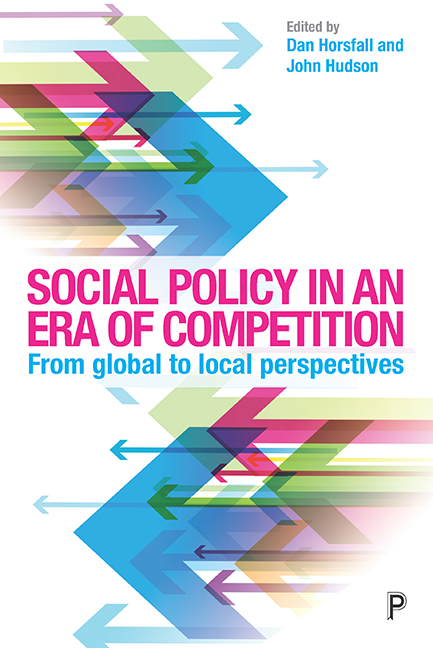Book contents
- Frontmatter
- Contents
- List of figures, tables and boxes
- List of contributors
- List of abbreviations
- Introduction: social policy in an era of competition
- Part One Global competition as the context for welfare
- Part Two The impact of intensifed competition on local governance
- Part Three The reframing of welfare discourses in an era of competition
- Part Four Conclusions
- References
- Index
three - From social regulation of competition to competition as social regulation: transformations in the socioeconomic governance of the European Union
Published online by Cambridge University Press: 05 April 2022
- Frontmatter
- Contents
- List of figures, tables and boxes
- List of contributors
- List of abbreviations
- Introduction: social policy in an era of competition
- Part One Global competition as the context for welfare
- Part Two The impact of intensifed competition on local governance
- Part Three The reframing of welfare discourses in an era of competition
- Part Four Conclusions
- References
- Index
Summary
Introduction
In this chapter we interrogate the character of contemporary socioeconomic governance in the EU. We explore the extent to which it has transformed into a neoliberal rule of law (May, 2014) that has placed competition at the heart of the European integration process and its related institutions. In this context, we contribute to the growing literature on the euro-crisis and the decline of Social Europe (Busch et al, 2013; Degryse et al, 2013; Hacker, 2013; Hillebrand, 2013; Crespy and Menz, 2015; Papadopoulos and Roumpakis, 2015; Romano and Punziano, 2015) and, more broadly, to the study of the constitutionalisation of neoliberalism (Gill, 1998; Brenner et al, 2014; Gill and Cutler, 2014; May, 2014).
The chapter draws on empirical evidence capturing the type and extent of regulatory changes in the fields of industrial relations, corporate governance and the coordination of macro-economic policy in the EU. These changes were neither mere responses to the eurozone crisis nor did they apply only to the crisis-hit member states. Many of them began prior to the eruption of the sovereign crisis but it is their pace and breadth that have accelerated since 2008. We argue that the effects of these changes are long term, cumulative and mutually reinforcing and should be seen as integral elements of a relatively coherent project to establish a form of transnational polity in Europe that privileges competition as its regulatory rationale.
The chapter analyses two distinct but related (and mutually reinforcing) transformations in EU socioeconomic governance. The first part reviews key judicial rulings in the fields of industrial relations and corporate governance. It shows how the European Court of Justice (ECJ) has been institutionally prioritising market freedoms and competition over labour rights, and especially the right to collective action in an emerging transnational regulatory field in the EU. This has led to a fundamental transformation of the regulatory landscape of industrial relations across Europe in terms that are very unfavourable to organised labour and the many nationally embedded arrangements that promote public rather than market-related objectives. The second part explores how recent institutional innovations have transformed the field of European macro-economic governance along a similar rationale.
- Type
- Chapter
- Information
- Social Policy in an Era of CompetitionFrom Global to Local Perspectives, pp. 53 - 68Publisher: Bristol University PressPrint publication year: 2017

